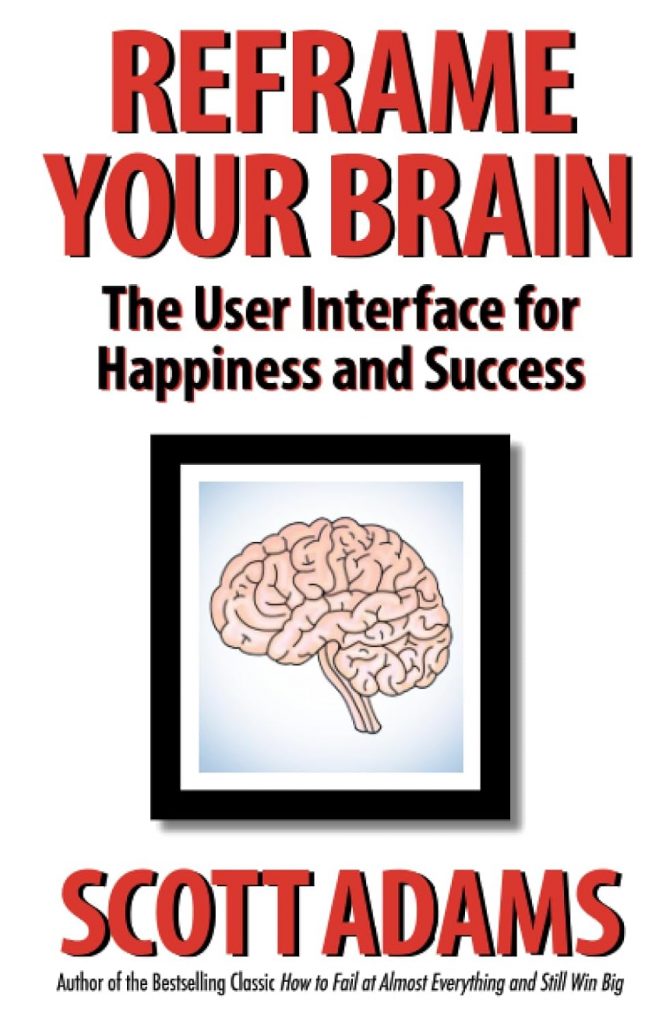Could changing how you view a problem help you solve it? Can you reframe your thinking and get better results?
It may surprise you, but both are true.
You can reframe your mind using simple phrases and mindset shifts, and bring significant changes to your life.
Whether you have problems that you just haven't been able to solve, or changes you'd like to make, but you can't quite get yourself to embrace them, you might just need a reframe.

Reframe Your Brain: Change Your Life
I recently read Dilbert creator Scott Adams's latest book, "Reframe Your Brain: The User Interface for Happiness and Success."
It's a simple idea with a powerful impact.
It turns out, setting the right intention with a phrase that personally resonates with you can make all kinds of habits, changes, and transformations a lot easier. Things you previously struggled to do (or not do) can suddenly become easier.
For example, if you want to stop drinking, a powerful reframe is, "Alcohol is poison."
I've actually had friends who use that exact reframe to explain why they don't drink, and I'm inclined to agree. While I used to ramble on about how it affected my sleep, and I didn't like some of the after-effects, "alcohol is poison" shortcuts all of that to 3 powerful words.
And since I've embraced that phrase, I haven't had a drop of alcohol, after previously drinking socially 1-2 nights a week.
Reframe your mind at work to be a better leader
While most of the reframes in Adams's book are things that help you in your personal life, a few of them apply to work, too. That's why today's post focuses on my 5 favorite reframes that can help you be a better manager.
If you like them, I'd encourage you to get your own copy of the book, because it has over 160 reframes that can improve your life physically, mentally, socially, and more.
Table of Contents: 5 ways to reframe thinking at work
- Manage your energy, not your time.
- Look for small ways to build momentum.
- Diversify your skills to become irreplaceable.
- Give them a good reputation to live up to.
- Your struggles are one reframe from being solved.

5 Ways to Reframe Your Thinking to be a Better Leader
Before we get started with the five reframes, I want to give you a quick layout of how we'll share them.
For each reframe, we'll start with the common thinking or "Usual Frame", and then give you the "Reframe" that works better.
For example, the previous reframe on drinking alcohol would look like this:
- Usual Frame: Alcohol is a beverage.
- Reframe: Alcohol is poison.
This helps you see how innocent, typical thoughts create space to overwrite them in a powerful way that helps you or your team.
So now that you know that, let's dive in...

Reframe #1: Manage your energy, not your time.
We start with a simple, yet powerful reframe that's so important in our busy, go-go-go world.
- Usual Frame: Manage your time
- Reframe: Manage your energy
"Ugh, how am I ever going to get this done?"
"I just don't feel like writing that report right now..."
These are common feelings we've all had, yet so often, the temptation is to focus on blocking and tackling your schedule. That's time management at its best and worst.
Yet, to truly do your best work, and especially thrive in the more creative areas, what you really need to do is manage your energy.
If you're at your sharpest first thing in the morning, with the creative juices flowing, don't waste that time answering emails and doing busy work. The same is true if you do your best work after a quick walk after lunch.
Either way, optimizing your schedule to do your most important tasks when you have the most energy is essential to being at your best. Doing so will have a bigger impact than any optimization purely based on time, and certainly will help you more than pushing yourself to work 12 instead of 11 hours each day.
How to apply this reframe to your team:
This reframe thinking is not just for you. It can help your team, and make you a multiplier. Here's a few ways you can apply this to your team:
- Find out when each of your team members is at their highest energy and either leave them alone, or schedule only the most important, creative, interactive and collaborative work with them at those times.
- Encourage your team members to observe their work week and identify when they had the most energy. Then, ask them to reflect on what they did shortly before to identify ways they might be able to have more of those windows.
- Block off "no meetings" or maker time for your team so everyone has some uninterrupted time for deep and creative work. This is why many companies have things like, "No meetings Wednesdays" or set time every day for no meetings, especially for those in creative roles.
Whether you're managing your own energy, or those of your team, it is a powerful reframe to consider how energy (and not simply time spent working) impacts the quality and quantity of work you and your team get done.
Further Reading:
- A key shift for leaders is to embrace priority management over time management.
- Sometimes taking a break is the most important thing you can do as a leader. Learn why here.

Reframe #2: Look for small ways to build momentum.
Often, the hardest step is the first one, which is why this way to reframe your thinking is so helpful:
- Usual Frame: The effort is so big and daunting, I can't even start.
- Reframe: What's the smallest thing I can do that moves me in the right direction?
Ever have a big deadline looming, yet find yourself doing everything except working on that task or project?
I certainly have. My apartment is never cleaner than when a big project looms.
That's why this is such a helpful reframe.
It's a reminder that if you have a project that you know you're procrastinating on, or that is intimidating you from even starting, the best thing to do is change how you're thinking about it.
Instead of worrying about how big the whole thing is, ask yourself what small part of it you can do *right now*.
I've unstuck myself many times doing just that through small tasks like:
- Making a simple, high level outline of what I want to write.
- Making black and white slides that only have a few words each for what I roughly want to talk about.
- Sketching 10 ideas on plain paper for a new design, knowing most of them won't be good, but I'll have some parts I do like.
- Duplicating the template I use for product specs and simply writing the correct title on it.
None of those tasks take more than 30-45 minutes, and like magic, every time I got unstuck. Suddenly, steps 2, 3, 4, and beyond become much easier and clearer.
Remember the Progress Principle when you apply this to your team.
Equally important is how this reframed thinking taps into a powerful concept we know well here on the Lighthouse blog: the Progress Principle.
Discovered by psychologists Teresa Amabile and Steven Kramer, it revealed:
"Of all the things that can boost emotions, motivation, and perceptions during a workday, the single most important is making progress in meaningful work."
That's right. Of all the things you can do at work, the thing that led to the most sustained happiness was the feeling of progress.
So not only should you use this reframe to help get yourself unstuck, but also recognize its great power for your team members. By helping them reframe thinking around their current task, your not just helping them stop procrastinating and get the task done, you're helping them feel meaningful progress.
That's a real win-win for you and your team.
Further Reading:
- Learn more about the progress principle and applying it to growing your team members here.
- Avoid this! If your team gets stuck for too long, they can start to feel learned helplessness.

3) Diversify your skills to become irreplaceable.
In the modern world, this perspective is quickly becoming essential:
- Usual Frame: Focus on being excellent at a skill that has commercial value
- Reframe: Acquire skills that work well together and make you rare and flexible at the same time.
I remember in an Electrical Engineering internship in college I had one of the senior engineers tell me his clever job security was that he was the only person at the company who could operate one of the high tech machines.
There was a time where mastery of such a single skill was the path to job security. Those times are quickly ending.
With the rise of AI, and so many things changing so quickly, your ability to master many skills is a much stronger path to job security.
Yet, even more than job security, it represents job opportunity.
The more you have mastered a variety of skills, the more new roles you look like a great fit. Whether that means your current company moving you from one role to another instead of laying you off, or another company seeking you out, the more you know, the more likely you are to be in demand.
Want something more concrete? Think about this. What's more rare and interesting:
- A) A full stack software engineer familiar with Ruby, React, Python, and Rust
- B) A full stack software engineer familiar with Ruby, React, and Rust, who also has experience with marketing and growth hacks
Yes, in some cases, the marketing skills won't matter if A & B are competing for an engineering job. However, if the company knows the role will require some time spent supporting the marketing team, Engineer B has a huge leg up in the interview process.
Remember the Power of Mastery when applying this to your team.
Once again, we have a reframe that isn't just a clever hack for your benefit. It also can improve the motivation and morale of your team when you apply it to them.
Dan Pink's research into motivation shows us that one of the big 3 ways to motivate people is to help them achieve Mastery in the skills of their job:
As a leader, that means you can tap into some of the most motivating work for your team, while helping them in the short and long term of their career.
All you have to do is find ways to help them expand their skills, and teach them this reframe so that they can recognize the great value of doing so.
Further Reading:
- This sort of complimentary and expanding skills mindset is a key part of growing your people, even when you can't promote them.
- A key part of being able to promote from within is that you successfully develop your team. Learn the pitfalls to avoid when promoting from within here.

4) Give them a good reputation to live up to.
What if you could turn criticism into praise? With the right reframe you can:
- Usual Frame: You did this wrong.
- Reframe: Your other work is stronger.
- or Reframe: I think you can top that. Let me show you how some people do it.
- or even Reframe: I'm not sure it's possible to do this better, but let's find out.
What do you notice about all the reframes? All of them are compliments to an extent.
- "Your other work is stronger" = You've done strong work that I've seen.
- "I think you can top that. Let me show you how some people do it." = I believe in your skills and abilities to do more, and want to help you get there.
- "I'm not sure it's possible to do this better, but let's find out." = This was really good, but I think you can handle the bar being raised even higher.
This sort of approach is how you make even difficult feedback an easier pill to swallow. And you do it all without watering down the actual message; while all of these likely precede or immediately follow the meat of your feedback, they do not change whatever you end up telling them.
Yet, they're all so much better than the sh*t sandwich, because they stay genuine and focused on the topic at hand, instead of fishing for random shallow praise to soften any blow.
An example in practice: Dale Carnegie agrees.
You know a lesson is timeless and valuable when the idea comes up today, and you can also reference the idea many decades ago.
Such is the case here, with this wonderful lesson from Dale Carnegie's classic (written 80+ years ago!), How to Win Friends and Influence People. A service manager for a truck dealership had to speak with a mechanic whose work had slipped, which he approached in exactly this sort of reframed way:
"Bill ...you are a fine mechanic. You have been in this line of work for a good number of years. You have repaired many vehicles to the customers' satisfaction....Yet, of late, the time you take to complete each job has been increasing and your work has not been up to your own old standards.
Because you've been such an outstanding mechanic in the past, I felt sure you would want to know that I am not happy with this situation, and perhaps jointly we could find some way to correct the problem."After the conversation, here's what happened:
"Did he do it? You can be sure he did. He once again became a fast and thorough mechanic. With that reputation Mr Henke had given him to live up to, how could he do anything else but turn out work comparable to that which he had done in the past."
How you frame your feedback can make all the difference, so keep this in mind next time you need to improve the performance or results of especially your best people.
Further Reading:
- Giving praise is a huge part of being a great leader. Learn 21 ways to give praise and be more positive here.
- There are many ways to give better feedback than a sh*t sandwich. Learn 6 here.

5) Your struggles are one reframe from being solved.
One of the biggest lessons I took away from the book was seeing how a good reframe can move you from an impasse to a solution. Our final way to reframe your mind at work is a great example of that:
- Usual Frame: I can't think of anything to write
- Reframe: I'm in the wrong environment for writing
Having writer's block is really frustrating. It can make you feel worthless, unproductive, and an imposter. Yet, forcing yourself to stare longer at the blank notepad or screen isn't going to solve it.
That's why instead you need to reframe your thinking.
Notice how the reframe focuses on changing something you can control; it's no longer about what you can or cannot write. Instead, it's about pondering the question, "what environment might be better for this task?"
Reframe your blockers
It's easy to think that the solution to your problems is to grit your teeth and grind it out. And sometimes you really do have to just grin and bear it.
But if you want to do your best work, you should really consider how you can reframe your thinking to your advantage.
For example, instead of focusing on the writer's block, ask how you can set yourself up for your best work:
- What time of day is that? (Remember our first reframe?)
- What smaller task can I complete to help build momentum? (Reframe #2)
- Where do I best do this kind of work? What can I try to mix it up?
And that last question is a great one for all leaders to consider. You don't do all work well in the same environment and circumstances.
For example, here's different places I find are best for different kinds of work:
- When I've done some light coding, nothing has worked better than a somewhat busy coffee shop.
- When I need to write (like this post), nothing beats locking myself in a quiet room while listening to EDM.
- When writing emails and doing busy work, I often sit on my couch with a movie on in the background.
- If I need to do some deep, strategic thinking, I prefer a quiet corner of the office, or the serene view from the balcony of my apartment.
Now, you don't need to have any of the same approaches as I do, but it would be to your benefit to figure out what your ideal setups are (and ask your team the same!). Experiment until you find them, and then optimize your schedule and environment for the kind of work you need to get done that day/week.
This is exactly the kind of skill that you can master for yourself, and then become a multiplier by teaching it to your team. They can benefit from reframing their thinking, too.
Further Reading:
- One of the best ways you can reframe yourself to be a better leader is to be more positive. Learn how you can boost your positivity here.
- Do you think leadership training is boring and pointless? Reframe your thinking with Lighthouse Lessons; leadership training can be concise, quick, and easy to apply to your team. Learn more here.
How will you reframe your thinking?
There are a limitless number of ways to reframe your mind to get more of what you want.
All you need to do is stop and consider what your current frame of mind is, and then consider what a better frame of reference could be. Then add a clever or memorable hook that works for you and you're on your way to a better way to look at your problems and opportunities.
Best of all, this skill transfers to all aspects of your life; from parenting to relationships, fitness to health, you can use reframes to help you reach new goals and change your mindsets.
If this resonated with you, I encourage you to try making some of your own reframes this week, and pick up a copy of the book to get over 100 reframes like the ones we talked about today.




